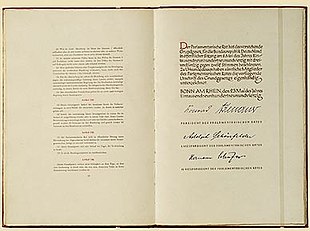Adolph Schönfelder
Heinrich Ferdinand Adolph Schönfelder (born April 5, 1875 in Hamburg ; † May 3, 1966 there ) was a German politician ( SPD ). From 1948 to 1949 he was the senior president of the Parliamentary Council .
Life and work

After attending elementary school, Schönfelder did an apprenticeship as a carpenter . During the First World War he fought on the Eastern Front and was to receive the Iron Cross 2nd Class there, which he refused. He lived with his family from 1906 to 1925 in the PRO apartment block on Lohkoppelstrasse in Barmbek and was chairman of the Central Association of Carpenters from 1921 to 1926. In 1933, as one of the owners of the SPD press publisher Auer & Co. and as a state board member, he was one of the initiators of the Hamburg Echo Assembly and was arrested. During the Second World War , Schönfelder was charged with high treason and imprisoned, but later released. After he was awarded the Mayor Stolten Medal in 1946 , he was made an honorary citizen of the city of Hamburg and an honorary senator of the University of Hamburg in 1950. He belonged to the Federation of Freemasons .
One of his daughters was Cäcilie (Liese) Schönfelder (born 1899). She was married to Walther Victor . Their son Heinz (Paul) Victor comes from this marriage, a communist who was a prisoner in Buchenwald concentration camp from 1944 until the liberation.
On May 3, 1966, Schönfelder died as a result of biliary surgery. The Adolph-Schönfelder-Strasse in Hamburg-Barmbek-Süd is named after him, as is the Adolph-Schönfelder-Grundschule, also in Barmbek-Süd.
Political party
Adolph Schönfelder joined the SPD in 1902. From 1946 to 1962 he was chairman of the SPD control commission.
MP
From 1919 until its dissolution in 1933 and then again from 1945 to 1961, Schönfelder was a member of the Hamburg Parliament , of which he was President from 1946 to 1960. In 1948/49 he was also a member, 1st Vice-President and Age President of the Parliamentary Council. In this capacity, Schönfelder drafted the Basic Law on May 23, 1949 together with Konrad Adenauer and Hermann Schäfer ; the constitutional charter bears his signature.
Public offices
Schönfelder was a police senator in the Hamburg Senate from March 18, 1926 to March 3, 1933 (→ Hamburg Senate 1919–1933 ). When the National Socialists came to power in Hamburg, Schönfelder, together with his SPD Senate colleagues, resigned from his Senate post on March 3, 1933, so as not to give the Reich any reason to intervene in Hamburg's autonomy. Paul de Chapeaurouge was his successor, who also resigned from the Senate three days later, after the police force had been transferred by Reich Interior Minister Wilhelm Frick to SA Standartenführer Alfred Richter . After the Second World War, Schönfelder was second mayor of Hamburg in 1945/46.
Web links
- Literature by and about Adolph Schönfelder in the catalog of the German National Library
- Newspaper article about Adolph Schönfelder in the 20th century press kit of the ZBW - Leibniz Information Center for Economics .
Individual evidence
- ↑ From the PRO block to the Schleidenhof - history (s) of an extraordinary apartment block, documentation of an exhibition at the Barmbek history workshop, October 2018
- ↑ Holger Martens : On the way to the resistance: The "Echo" assembly of the Hamburg SPD 1933 , page 63 ( online ). 1st edition 2010.
- ↑ Honorary Citizen in Hamburg on the homepage of the Hamburg Citizenship ( Memento from September 29, 2007 in the Internet Archive ).
- ↑ Honorary Senators of the University of Hamburg ( Memento from December 4, 2016 in the Internet Archive )
- ↑ Der Spiegel 15/1963 of April 10, 1963, p. 58 f.
- ^ Message from the archivist of the Buchenwald Memorial, Sabine Stein, from September 29, 2018 | Buchenwald concentration camp archive
| personal data | |
|---|---|
| SURNAME | Schönfelder, Adolph |
| ALTERNATIVE NAMES | Schönfelder, Heinrich Ferdinand Adolph (full name) |
| BRIEF DESCRIPTION | German politician (SPD), MdHB, Senator |
| DATE OF BIRTH | April 5, 1875 |
| PLACE OF BIRTH | Hamburg |
| DATE OF DEATH | May 3, 1966 |
| Place of death | Hamburg |
